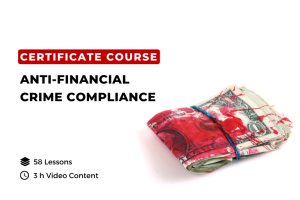
Certified Anti-Financial Crime Professional (CFCP)
Take your Anti-Financial Crime Career to the next level with a Financial Crimes Certification!

Certification Description
Financial institutions such as banks, insurance companies, brokerage houses, and other entities face financial crime risks and incidents. Criminals such as money launderers, terrorists, tax evaders, insider traders, cyber attackers, etc., all try to break the organizations’ controls and gain access to systems, people, and information for their benefit.
Our Certificate Program for Anti-Financial Crime Professional (CFCP) is designed for professionals in departments and functions, including compliance, anti-financial crime compliance, fraud investigation, fraud detection, internal controls, fraud risk management, and internal audit. This online course may also be attended by other professionals interested in learning about the core concepts of financial crime, financial crime prevention, and the anti-financial crime framework and principles.
In this anti-financial crime professional certification, you will learn about the core concepts of financial crime and the anti-financial crime framework and programs developed and implemented in organizations to prevent financial crime. Financial crime risk assessment and evaluation processes are also covered in this training course. Finish all the courses in this learning path while maintaining active membership to get the certificate!
Learning Path
What You Will Get From This Certification
In-demand Skills
Gain the relevant knowledge to ensure that you are supporting your firm and progressing your anti-financial crime career.
Career Credential
Get a certificate from the FCA Financial Crime Academy.
Flexibility
Study on-demand and at your own time and pace, regardless of where you are in the world with this flexible online course.
Global Community
Get access to our exclusive LinkedIn group with 1,500+ like-minded professionals and experts.
Certification Material
Download supplementary financial crime course material such as the comprehensive course study guide.
Quiz Questions
Test your knowledge with multiple-choice questions and determine which skills you have mastered!
Certification Overview
- Understand the various types of financial crimes, including money laundering, terrorism financing, tax evasion, insider trading, and cyber attacks.
- Identify the financial crime risks and incidents that financial institutions, such as banks, insurance companies, and brokerage houses, face.
- Explore the controls and security measures that organizations implement to protect against financial crime.
- Examine the roles and responsibilities of professionals in departments and functions related to anti-financial crime, such as compliance, fraud investigation, fraud detection, internal controls, fraud risk management, and internal audit.
- Learn about the core concepts and principles of financial crime prevention.
- Gain knowledge of the anti-financial crime framework and programs implemented in organizations to prevent and detect financial crime.
- Understand the processes involved in financial crime risk assessment and evaluation.
- Successfully complete all courses in the learning path to earn the Certificate for Anti-Financial Crime Professional (CFCP).
- Maintain active membership to stay updated on the latest developments and trends in anti-financial crime practices and regulations.
- Professionals in compliance departments
- Professionals in anti-financial crime compliance roles
- Fraud investigators and professionals involved in fraud detection
- Professionals responsible for internal controls
- Those engaged in fraud risk management
- Internal audit professionals
- Other individuals interested in learning about financial crime prevention and the anti-financial crime framework and principles
For participating in this Ant-Financial Crime Certificate Program, you will need an electronic device with online video-viewing capabilities (e.g., smartphone, tablet, laptop, desktop computer, etc.). You will need no previous knowledge in compliance or anti-financial crime, although this is helpful. A background in business, legal, or finance might also be beneficial but is not required.
This AFC Certification Program is presented entirely online. Modules can be completed in your own time and at your own pace. This interactive, supportive teaching model is designed for busy professionals and results in unprecedented certification rates for Certification Programs.
What our students are saying
Frequently Asked Questions
The best certification for financial crimes can depend on your specific career goals and the area of financial crimes you wish to specialize in. Currently, we offer three well-recognized certifications:
- Certified Money Laundering Prevention Professional (CMLP): Ideal for individuals focusing on anti-money laundering and counter-terrorist financing compliance.
- Certificate for Anti-Financial Crime Professional (CFCP): Suitable for those seeking a broader understanding of financial crime prevention, including AML, fraud, and cybercrime.
- Certified Audit and Investigations Professional (CAIP): Geared towards professionals interested in audit and investigations within the financial sector.
Consider your career goals and the particular expertise you wish to develop to determine the best certification among these options. Each certification program provides unique benefits and knowledge tailored to its respective focus.
Becoming an expert in the financial crime niche requires a combination of education, experience, and ongoing professional development. Here are steps to help you achieve expertise in this field:
Obtain relevant education (bachelor’s degree).
Gain experience in related roles.
Pursue certifications (e.g., CAMS, CFE, CFCS).
Stay updated on industry trends.
Network and seek mentorship.
Develop specialized expertise (e.g., AML, fraud).
Maintain ethical conduct.
Hone problem-solving and tech skills.
Enhance leadership and communication abilities.
Adapt to evolving challenges and regulations.
Skills needed to be a financial investigator:
- Analytical thinking: Ability to assess financial data and patterns.
- Attention to detail: Precise examination of financial records.
- Communication: Effective reporting and presenting findings.
- Knowledge of laws: Understanding financial regulations.
- Research: Proficient in investigative techniques.
- Technology: Utilize digital tools for data analysis.
- Ethics: Maintain high ethical standards.
- Problem-solving: Resolve complex financial cases.
- Adaptability: Stay updated on evolving financial crimes.
A financial crime operations analyst is responsible for monitoring financial transactions, identifying suspicious activities, conducting investigations into potential financial crimes, collaborating with relevant parties, and reporting findings to prevent money laundering, fraud, and other illicit financial activities.
All of our financial crime certification programs are open to students and professionals in various industries and levels of experience. Our curriculum is designed to teach what you need to know from basic fundamentals to advanced practical case studies. To take the courses and complete the exercises, students will only need access to a PC and/or Mac, a smartphone or tablet, and a stable internet connection.
The CFCP (Certificate for Anti-Financial Crime Professional) certification does not have an expiration date and is considered valid indefinitely. This means that once individuals have successfully obtained the certification, they do not need to renew it or take recertification exams. It is a permanent certification that signifies their expertise in the field of anti-financial crime.
Absolutely! All the files (including study guide, audiobook, course slides, etc.) in a course are available for download. Just look for a module that shows the files within a course.
You will have yearly access to the courses as long as you maintain an active subscription. All the courses are self-paced as well so you can take your time in learning without worrying about any deadlines.
Check our Frequently Asked Questions Page
30 Learning Hours
Downloadable Resources
Extensive Template and Policy Library
Certifications
Share
Download Syllabus
Do you want to learn more? Download the syllabus to get in-depth insights into your learning journey.
Learn In-Demand Skills with On-Demand Courses
Gain the relevant skills and knowledge to ensure that you are supporting your firm and progressing your career.




